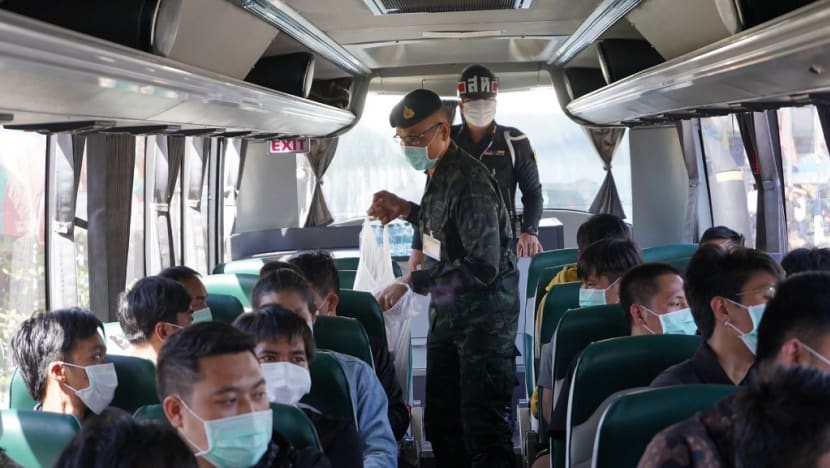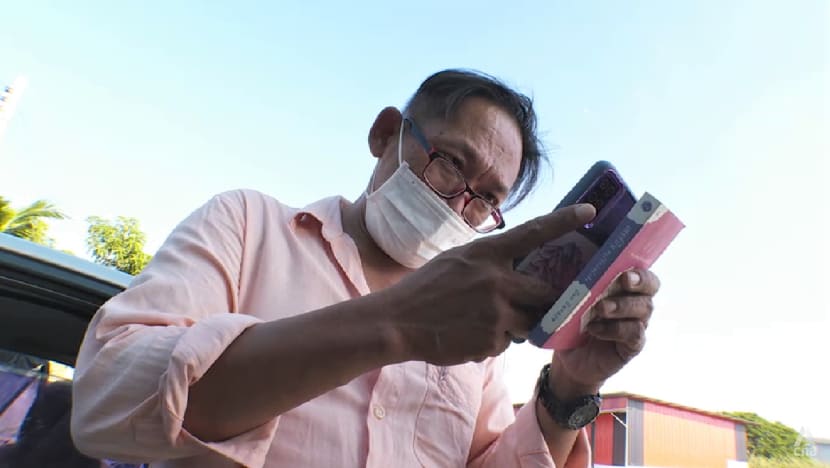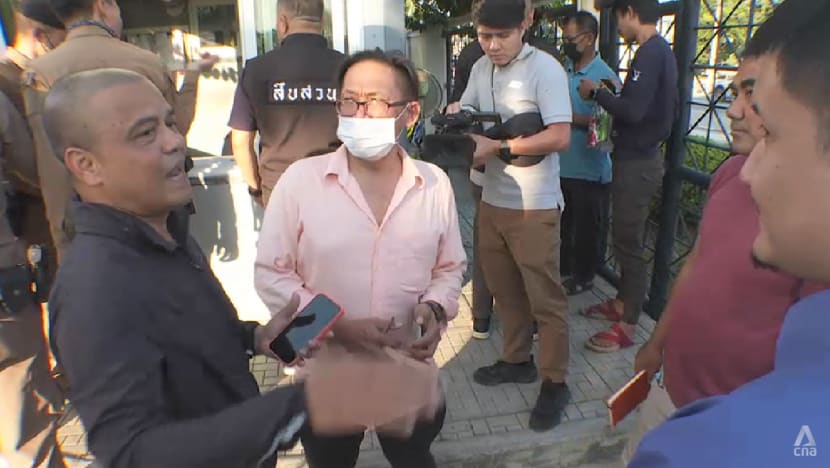At least 30 Thai nationals still believed to be trapped in Laukkai town in Myanmar amid intense fighting
Some Thais were reportedly promised attractive job opportunities with international companies in Myanmar, but were instead tricked into working as call centre scammers there.

This handout photo taken and released on November 18, 2023 by the Royal Thai Army shows Thai military personnel with some of the 41 Thai nationals on a bus to Mae Sai after they returned to Thailand after being trapped in Myanmar. Forty-one Thais trapped in Myanmar for three weeks by an upsurge in fighting between the junta and an alliance of ethnic minority armed groups returned to the kingdom on November 18, the Thai army said.
Handout / ROYAL THAI ARMY / AFP

This audio is generated by an AI tool.
BANGKOK: He did not know if his 26-year-old son, who was asked to work in Myanmar six months ago, was dead or alive.
But earlier this week, relief came for the worried father, who only wants to be known as Polpisit, when he learned his son was evacuated to Bangkok through China on Monday (Nov 20) morning.
The 52-year-old claimed that his son, who was offered an attractive job opportunity with an international company, was instead tricked into working as a call centre scammer in Myanmar’s Laukkai town.
At one point, Polpisit even thought that "the employers would exploit my son, kill him and sell his kidney", and his son's bones "might be the only thing I get back".
“He has now been granted a second chance at a new life,” he said.
“When he was still stuck in Laukkai, I was not sure when the bombs or the war would reach him.”

This comes as clashes across Myanmar continue, with anti-coup fighters battling the military for control. Armed ethnic groups have reportedly taken over more than 150 bases and outposts of the Myanmar military in the borderlands.
But some experts believe Myanmar's military will likely continue to prevail in the armed conflicts, despite losing military posts and control of some areas.
“At the end of the day, the military still remains the strongest in terms of firepower. So it is likely to still prevail in most of these conflicts,” said Ms Sarah Yan, an associate director at global risk consultancy Control Risks.
The armed ethnic groups are “not necessarily united because they are all opportunistically looking out for their self-interests”, added Ms Yan, noting that the military will “definitely fight tooth and nail to remain in power because the stakes are simply too high for it to fail”.
“The long and short of this is that we will likely continue to see a cycle of violence and instability in Myanmar,” Ms Yan told CNA’s Asia First on Wednesday.
“But the situation remains very fluid and there are no indications yet that the military will concede.”
RELATIVES UNABLE TO SEE RETURNEES YET
Meanwhile, Thailand has evacuated some 300 Thai nationals who had been caught up in the conflict in Myanmar.
At least 30 Thai nationals are still believed to be trapped in Laukkai town in Myanmar’s northeastern Shan state.
Other nationalities like Malaysians and Filipinos are also said to be among those still stuck in Laukkai.
Increasingly, these foreigners are also dealing with food and water shortages.
Laukkai has seen intense fighting between ethnic armed groups and the Myanmar military, which seized power in a 2021 coup.
A 30-year-old Thai, who gave her name as Pang, said her boyfriend went to work in Myanmar just two months ago.
He was offered an attractive monthly salary of about US$850, with free accommodation and food.
Her boyfriend, who had never left the country before, felt this might be a great opportunity to work overseas in Myanmar.
But Pang recounted how at one point, her boyfriend grew suspicious after seeing armed men around the work premises.
He also contacted her, asking her to inform the Thai authorities.
However, she said: “I didn’t have the courage to do so. That is because there was a high risk that he may be identified and that he may eventually be harmed.”
While Pang is happy that her boyfriend has returned safely, she is now faced with another worry for her partner, as Thai authorities believe many of the evacuees worked in Myanmar as cyber scammers in exchange for handsome payouts.
“I wish I could help by providing some evidence so that my boyfriend will not be accused of scamming activities. Many are convinced that these people are call centre scammers, but that is not true. Many were not willing to work there in the first place and my boyfriend is one of them.”

The relatives of those evacuated have not been able to see them so far.
Authorities said they are unable to allow the families to meet the evacuees held up inside a government facility at the moment, but have assured them that the victims are well and healthy.
Authorities are interviewing the returnees to find out their actual status and why they were in Myanmar in the first place.
A few of the returnees have criminal records and will be processed accordingly, the authorities have found.
The government will also continue to investigate the cybercrime situation and help evacuate citizens from war-torn Myanmar.
ENSURING FAIR TREATMENT FOR RETURNEES
Thai MP Kannavee Suebsang, who has met with concerned family members, has promised to work on ensuring fair treatment for the returnees.
He said authorities should use the National Referral Mechanism framework to accurately identify human trafficking victims and ensure they get the proper support.
“The main reason for people to become victims of human trafficking processes is a lack of jobs in Thailand,” he added.
“So the education for the Thai people needs to be provided, and at the same time all the law and the existing procedure that need to protect people who become victims of human trafficking also need to be correct and has to be developed.
“And at the same time, a regional framework that's working on prevention of human trafficking needs to be promoted.”
Non-governmental organisation Immanuel Foundation, which rescues victims of human trafficking, has played a role in evacuating the Thais from Myanmar.
“If they had not been rescued, they would have continued to be forced labourers and been beaten up,” said Mr Jaruwat Jinmonca, co-founder and vice president of the organisation.
He is still in contact with many of the Thais who remain stuck in Myanmar’s Laukkai town.
Mr Jaruwat related how some of them told him that calls back home to their families would be closely monitored, and they were beaten with batons and even suffered electric shocks.
“They would have been forced to scam many. Medicine is not provided for the sick. The best they would get is paracetamol or (an intravenous line)," he said.
“The victims don't have any freedom and the worst-case scenario is they may be killed.”

















